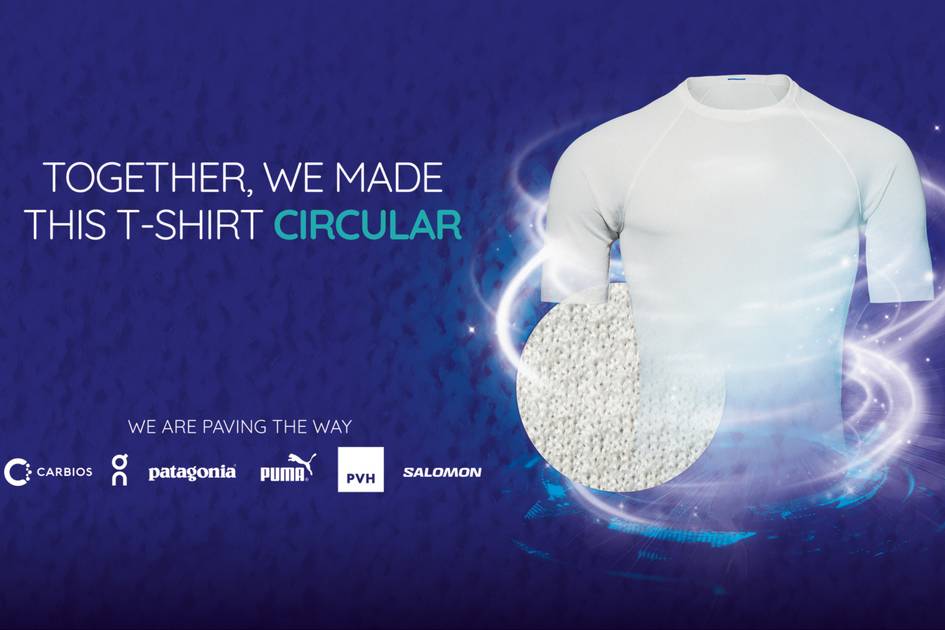"Technological masterpiece" $ALCRB (+0.44%)
On, Patagonia, Puma, PVH, Salomon score with Carbios' fiber-to-fiber recycling
Just over two years ago, in July 2022, the four textile and footwear suppliers On, Patagonia, Puma and Salomon announced that they had joined forces with the French biochemical company Carbios to use its unique biorecycling technology to recycle synthetic fibers and improve the recyclability and ongoing reusability of their products.
This collaboration has now borne fruit with the launch of the first garment made from 100% textile waste in a biological recycling process developed by Carbios: a white T-shirt created from colored and mixed textile waste.
"This T-shirt is the first tangible result of our fiber-to-fiber consortium with Carbios. Together, we have overcome the textile challenges and produced a garment from enzymatically recycled waste that matches the quality of virgin fibers," affirms Salomon's Head of Product for Softgoods Guillaume Meyzenq in a press release.
How does Carbios' biorecycling technology work?
Polyester is broken down into its basic building blocks (the monomers PTA and MEG) with the help of enzymes, which are converted into biorecycled polyester. The monomers are repolymerized, spun into yarn and woven into a new fabric by external partners in the next step. "The quality of the recycled textiles is comparable to that of new petroleum-based polyester," concludes the consortium.
Its aim is to jointly drive forward the circular economy transformation of the textile industry and further develop Carbios' enzymatic depolymerization technology in order to achieve 100% "fibre-to-fibre" recycling.
"This allows textile waste to replace petroleum as a raw material for the production of polyester textiles, which in turn become raw materials again, thus initiating a circular economy process. An additional benefit is a lower carbon footprint and the reduction of waste that would otherwise end up in landfills or incinerators," reads the press release.
"Technological masterpiece"
The partners, who were joined by US luxury group PVH Corp, deliberately chose a plain white T-shirt as the most convincing way to showcase the performance of the technology that made production from mixed and colored textile waste possible.
"It may look like an ordinary T-shirt, but make no mistake, the technology behind it is extraordinary. "The 'fiber-to-fiber' recycling is a technological tour de force," confirms Carbios CEO Emannuel Ladent .
"Recycling fibers into fibers is a crucial step in driving the circular economy in our industry. That is why we have invested energy and money in research in this field," says On's Sustainability Director Begüm Kürkçü.
By working with the partner companies, Carbios was able to "overcome many technical hurdles" and produce the "world's first enzymatically recycled T-shirt made entirely from biologically recycled fibers", according to Ladent.
Which textiles were used?
The members of the textile consortium sent rolls of textile scraps and production offcuts to Carbios' headquarters in Clermont-Ferrand, France. These included mixed fabrics, including cotton or spandex, as well as textiles that had been treated differently (such as permanently water-repellent materials) and dyed - all materials that present a major hurdle for conventional recycling processes.
"Puma's ambition is for 100 percent of our polyester to come from textile waste. Today's announcement is an important milestone on the way to achieving this and making our industry more circular," comments Puma's Head of Sourcing Anne-Laure Descours in the press release.
"We now need to work together to ensure that we can scale up this technology to have the greatest possible impact. We are excited to be part of this breakthrough and to set new standards for fiber-to-fiber recycling," adds Descours.
Carbios also recently entered into an industry collaboration with the Norwegian company Tomra Textiles to establish an efficient recycling stream in Northern Europe, ranging from the collection, sorting and treatment of textile waste to recycling using Carbios' enzymatic depolymerization technology. The first commercial plant for this technology is currently being built in Longlaville, France.
The development represents a milestone, as currently the majority of recycled polyester in the fashion industry is derived from PET bottles and only one percent of all fibers are recycled into new fibers. Reaching for the raw materials of another, unrelated industry such as the food industry therefore makes no sense in view of the mountains of clothing that often consist of polyester and polyester blended fabrics. Previously, recycling failed due to a lack of suitable technology, but Carbio's enzymatic depolymerization technology makes this possible.
Given the fashion industry's increasing use of new, fossil-based synthetic fibers and the continued popularity of polyester, the approach taken by On, Patagonia, Puma, PVH, Salomon and Carbios appears to be the right one, at least until the existing polyester legacy has been used up and the complete switch to materials of non-fossil origin has been achieved.






